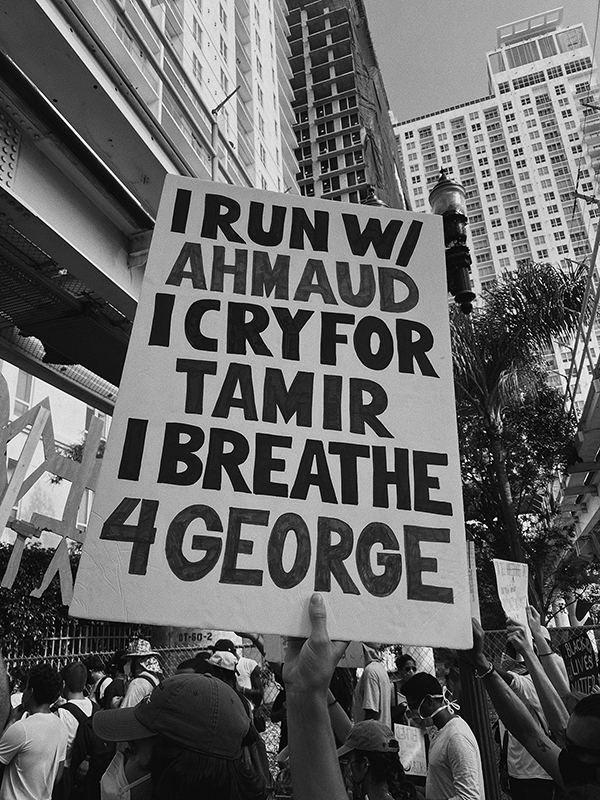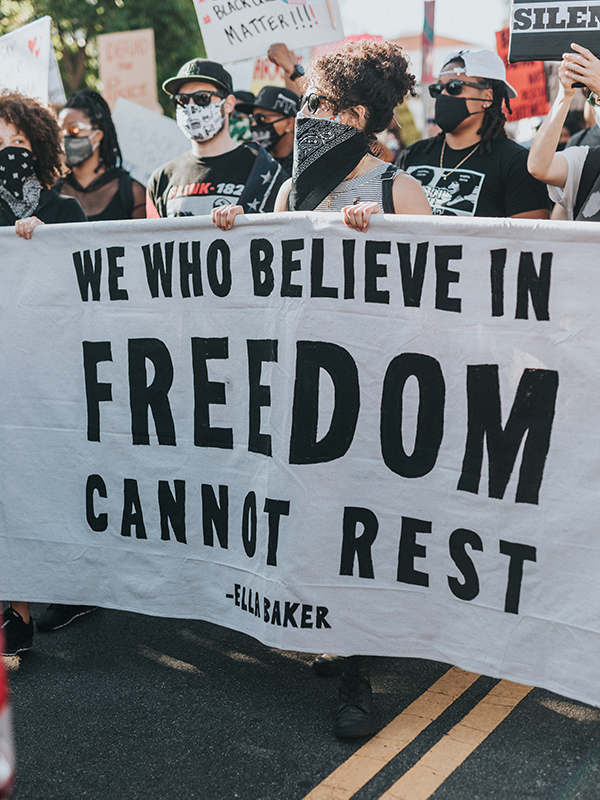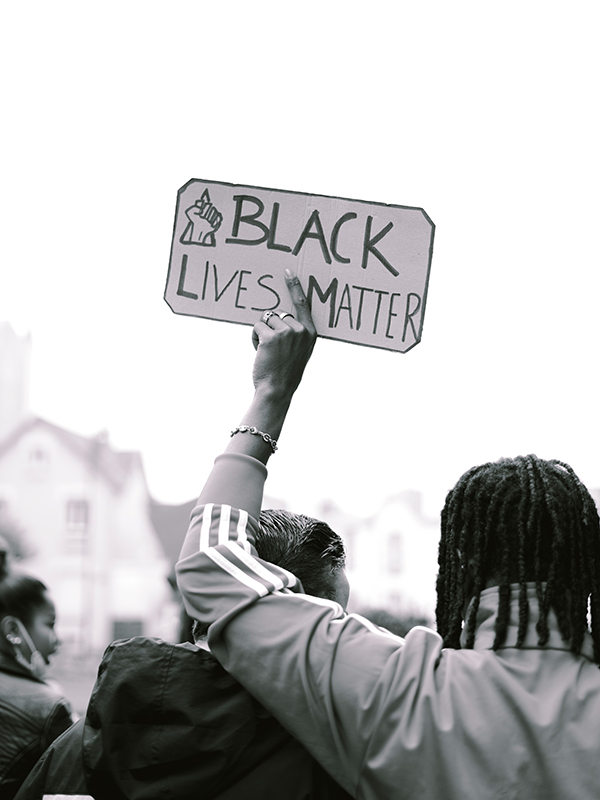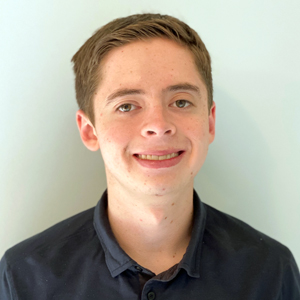Racial injustice has led to calls for action around the world, a call that was elevated when George Floyd died with a police officer’s knee on his neck and one that Black athletic leaders at Arizona State University have turned into a pledge: We 22.
The initiative by 22 Black men – fathers, sons and husbands who have endured the pain of systemic racism – grew out of anger and frustration over “repeated cycles of national disregard for black life,” the declaration reads.
The toll of 400 years of racism, they wrote, has led to discrimination in home ownership, police violence, disparities in wealth accumulation and a host of other ills that afflict generation after generation of Black people.
We 22 participants will take action in seven core areas: develop young men and women beyond the athletic field, enhance fiscal education and encourage students to vote, to protest and be activists, to join local and campus organizations and to immerse themselves in ethnic studies. The members also pledge to model “grown man behavior” that shows the way to a future that is radically different from the nation’s past.
The recent deaths of Floyd and other African Americans, including Ahmaud Arbery and Breonna Taylor, spurred the men to action.
“This is a pivotal moment in time in which we must put our knee on the neck of the mentality that applauds Black athletic performance but does not see the full humanness of black lives,” the statement says.
The group started meeting before Floyd’s death in Minneapolis on May 25, but the effort gained urgency after release of a nearly nine minute video showing Floyd’s agonized last moments that horrified the world and immortalized his final words: “I can’t breathe.”
“We had already started meeting every other week, just to talk about how to impact student athletes, how to impact our families,” ASU Deputy Athletic Director Jean Boyd said. “But when those things started happening, as you can imagine, it was kind of fuel to the fire of our passion to make a difference.”
Alonzo Jones, an associate athletic director, was a member of the group Boyd described as an “organic collection” of African American men who work in Sun Devil Athletics. But they hope the drive will spread to other athletic programs across the country.
“It was just a dialogue opportunity, but then, when the George Floyd incident occurred in Minneapolis, obviously, that was very heavy on the nation’s heart and that was heavy on our spirit,” Jones said of the declaration. It was announced in June, before other cases of racial violence gained attention.
“We asked as a collective group, ‘What can we do?’ – particularly as we saw the impact on our student-athletes. We are going to mobilize to solve local, national, and global problems,” Jones said. “That’s one of our directives.”

‘will systematically develop young men and women who are champions in their education and lives’
Jones and Boyd talked about defeating a harmful narrative that Black men and women are celebrated only for their athletic talents, rather than their humanity. We 22 hopes to encourage student athletes to be champions on and off the field.
A 2011 study by the Opportunity Agenda suggested that many portrayals of Black men and women in the media often are harmful stereotypes, or portray Blacks as having careers limited to entertainment and sports, such as a rapper or NBA player, that are difficult for most Americans to achieve. These portrayals can have a negative impact on how Black people perceive themselves and their community, the study said.
“This narrative of overrepresented in jail, underrepresented in home ownership, underrepresented in graduation from colleges, all these stats over time have plagued the Black community,” Boyd said. “And so we wanted to double down on our systematic approach to empowering these young male athletes, particularly African American student athletes.”
An example of that narrative is when Fox News commentator Laura Ingraham told NBA star LeBron James to “shut up and dribble” in 2018.
“To show that she only thought of him as an athlete, and nothing beyond that, whereas LeBron has funded a ton of money back in Ohio towards opening a school and all these other things, I think that attitude definitely holds presence,” said Denzel Burrell, an associate director of women’s tennis, men’s track and field and wrestling at ASU. “We’re trying to attack it and address it by teaching our student athletes and showing them that there’s more to life than just being a student athlete.”
Most college athletes pursue a different career after they graduate. In Division 1 college football and basketball programs, up to half the players are Black, according to a NCAA demographics database.
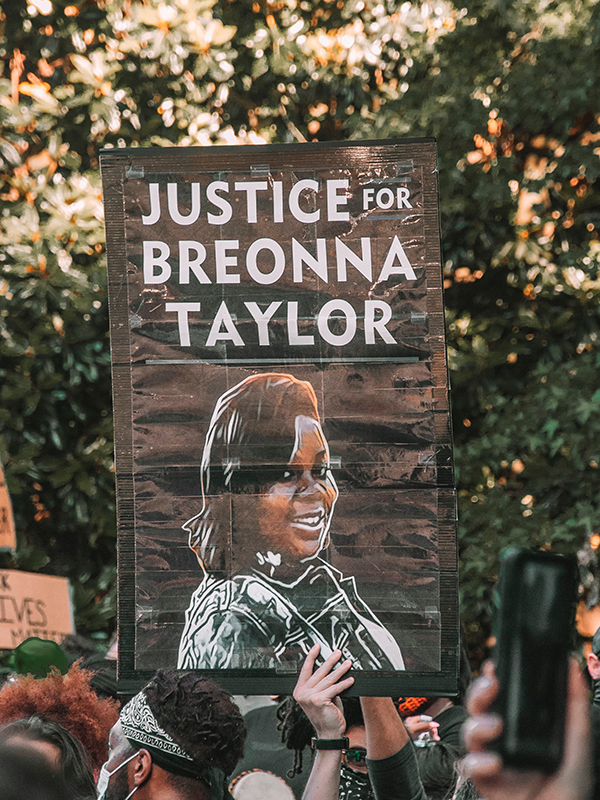
A sign at a Black Lives Matter protest in Atlanta memorializes Breonna Taylor, a medical worker shot to death by police in her home in Louisville, Kentucky. One police officer has been fired, and Louisville leaders have since banned no-knock warrants that allow police to forcibly enter homes without warning. But family members and supporters continued to demand criminal prosecution in a case that has drawn wide attention. (Photo by Maria Oswalt/Creative Commons)
However, the NCAA determined that the probability of a male college basketball player getting selected in the 2019 NBA draft was 1.2%, regardless of race. The probability of a college football player being selected in that year’s NFL draft was 1.6%, and a women’s basketball player had just a 0.8% chance of being drafted. (The NCAA did not include undrafted free agents as part of the sample for players going professional).
Boyd wants to teach Black student athletes that their name on their jersey matters just as much as their number, and that they shouldn’t be consumed by their identity as a college athlete.
“Internally, we need to help our young African American men and women understand that their value to society goes way beyond just scoring a touchdown or making a basket or free throw,” Boyd said. “Their value in our society is in their minds, and in their language, and how they stand up for what they believe in.”
Boyd hopes to present young African American men and women to society who are not only celebrated for being college athletes, but also for achievements in the classroom and success with internships and jobs. He pointed out one ASU athlete as an example.
“Kyle Williams graduated as a biochemistry major and he’s interned at the Mayo Clinic. He’s going to be an orthopedic surgeon when he’s done with football,” Boyd said. “First generation college student, man. So if you just look at number 10, a good little receiver who’s versatile, you might miss the fact that this guy might be doing your knee surgery in 10 years.”

‘will enhance fiscal education to create financially stable families with philanthropic mindsets’
Economic inequality plagues Black families. A June 2020 report from the Economic Policy Institute determined the average hourly wage of a working Black male in America in 2019 was a little more than $20, or 71% of the average wage of a working white male, at $29. The salary of Black women was even lower: the average wage of a working Black female, about $18, was 83% of the average wage of a working white female, who made an average $22.
Perhaps most telling was the differences in household income. The median household income of a Black household in 2018 was $41,692, while the median income of a white household was $70,642.
We 22 aims to enhance fiscal education to help close this economic gap, especially given the diverse geographic and economic backgrounds of student athletes.
“Foundations are different, amongst different cities, amongst different states, even with our international students,” Burrell said. “We really think that’s really the first step. Understanding the money and understanding how to really budget yourself.”
Jones said he hopes to employ an aggressive literacy campaign around financial decision making and management.
“Beginning in the freshman year, we’ll begin financial education on budgets. How do you budget and track your money, how to use technology for that,” Jones said. “We’ll also talk about savings tools, at a core, for some low risk kind of exploration of observing money being set aside, and revisiting it to see it accumulate later.”
Boyd said teaching a young person the importance of such concepts as credit, credit score, a FICO score, compound interest and other areas of finance can lead to economic empowerment.
“These are just examples of things that a lot of minority communities are not as versed in, they’re not taught as much,” Boyd said. “They don’t see their family participating, you know, in financial literacy and awareness that way.”

‘will educate, register and encourage voting in local and national elections’
From the 2012 presidential election to the 2016 election, Black voter turnout fell to 59% from 66%, according to the Pew Research Center. Black voter turnout in midterm elections rose to 51.4% in 2018 from 40.6% in 2014, it said.
To increase turnout, We 22 aims to foster voter participation on multiple levels, including local, state, and national elections.
The first step of the process is to get students to register to vote.
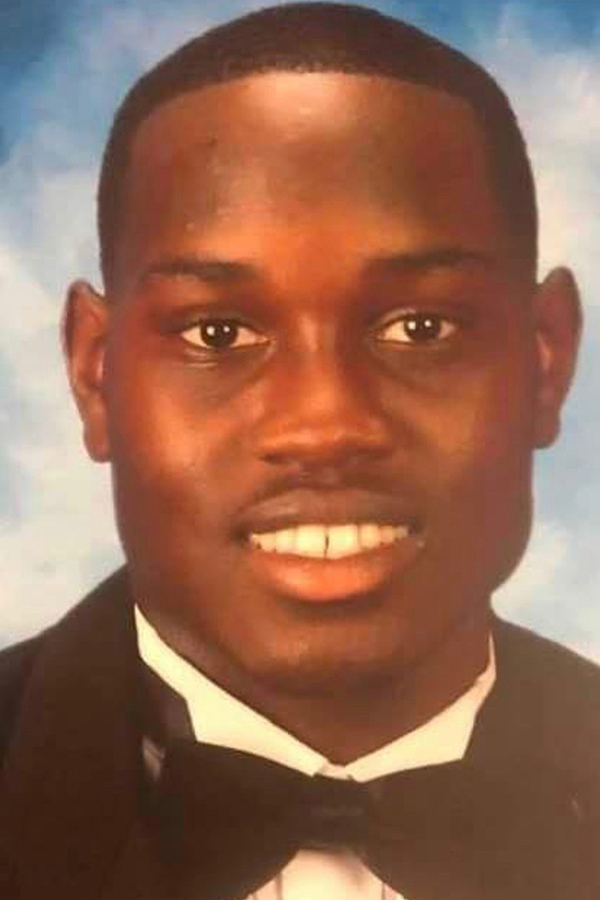
Ahmaud Arbery, 25, went for a jog in a south Georgia neighborhood in February. Two men chased him, there was a struggle, and Arbery, who was unarmed, was shot to death. Months after his Feb. 23 death, three white men accused of attacking him were arrested. (Photo by Camryn Billett/Creative Commons)
“A lot of our student athletes are not registered, are fearful of voting and don’t really understand the process,” Burrell said. “I think a lot of them are uneducated related to the dates, the timelines, the terms some of our public officials can hold, when elections are held, both locally, statewide and nationally.”
Jones emphasized that it’s important to inform voters on issues so they don’t vote purely based on political party affiliation.
“Our goal is to register a student,” he said. “They register to whatever party affiliation they wish to, and we’ll have an educational platform so they can study and research different candidates. And ultimately, at the time of the election, they would vote from an informed perspective.”
We 22 also aims to educate Black student athletes on American politics, political language, and political issues.
“I think having an understanding before you’re stepping into a booth knowing exactly what propositions are going to be voted on and the pros and cons of each of the candidates, so you know exactly what person A stands for versus person B and then selecting solely based on your beliefs on those issues,” Burrell said.
Local government is just as crucial as national politics, the members of We 22 say.
“On a local level, your vote absolutely does count,” Boyd said. “And if you can get a core group of people who have a cause or something they want to influence guideline wise, or for policing, you can actually have a huge say in how that plays out.”

‘will encourage participation in safe and productive free speech and social protests’
As of July 3, according to the New York Times, 15 million to 26 million people across the U.S. had attended protests sparked by the death of George Floyd. Arizonans were among them.
Activism, including protests, have been controversial in sports since sprinters Tommie Smith and John Carlos raised their fists at the 1968 Olympics and the NFL’s Colin Kaepernick took a knee during the national anthem during the 2016 season.
Boyd believes that in times like these, student athletes should make their voices heard. He pointed to ASU tight end Nolan Matthews’ Twitter statement as an example.
“He talked about being a young Black man in America, and what that’s like and what things he fears and what he hopes for,” Boyd said.
Boyd made sure to encourage Matthews to speak his mind, and to know that he would not get in trouble by using his voice in a respectful manner.
